When considering doing business in China, the first question that always comes to your mind is: in which city should I start my business? Choosing the right city to pursue your success in China is not a simple question. There are numerous factors to consider. The business attractiveness landscape is the comprehensive result of the business resource aggregation, urban hubness, resident activity, and future plasticity and development potential.
Business Attractiveness and Eco-system in China – Chinese Cities Series!
To help you choose your ideal location to start your business, Hongda has planned a series of blogs on the business attractiveness and eco-system in major cities and regions across China, including Beijing, Shanghai, Guangzhou, Shenzhen, Hainan, and Hong Kong S.A.R.!
Still not sure how to choose the optimal destination for your investment? Simply book a free meeting with Hongda’s consultation and we will discuss your business plan and advise you on the most suitable city for you to run your company. If you want to know the investment landscape of any other cities in China, you are also welcome to contact us and let us know your requirements!
Related blogs on China city series:
Shanghai – A Magical City of Excellence
Introduction to Shanghai
Shanghai, originally a small fishing town locating on the southern estuary of the Yangtze River, now becomes one of the most populous cities in the world, known as a major center of finance, economics, science and technology, and manufacturing. With the Huangpu River flowing through it, this city has the world’s busiest container port, making it a hub of international trades. Shanghai nourishes over 24.8 million residents, who contributes to the GDP of nearly 4.46 trillion RMB and makes Shanghai the largest economic center by GDP in China.
After experiencing the economic reforms by the 1990s, an intense development has occurred, especially the Pudong New Area. With the establishment of Shanghai Stock Exchange and the Shanghai Pilot Free Trade Zone, Shanghai is home to 12 companies of the Fortune Global 500 and numerous technology-oriented enterprises as well as world leading universities.
Nicknamed ‘Modu’, or the Magical City, among the youth, Shanghai is attracting global attention, especially in the Shanghai FTZ, the ever first free-trade area in the Chinese mainland. Several preferential policies have been implemented to attract foreign investors, making it an ideal investment destination in the east of China.
Read this blog for more key information about Shanghai and some of the key factors to pursue your success in Shanghai!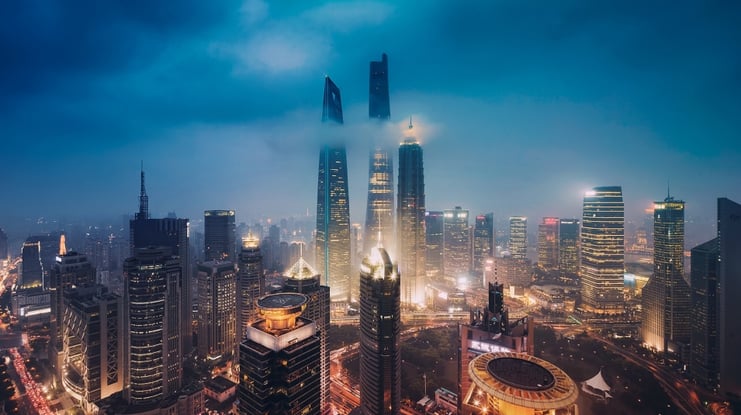
Understand Shanghai's Key Investment Sectors
The year 2023, the middle of the 14th Five-Year Plan period, is considered key point of critical importance in terms of the development of Shanghai. With the goals of making progress in high-quality development, achieving higher living standards, and realizing higher governance efficiency, Shanghai will continue to enhance its core functions and advantages by leveraging the major strategic tasks concentrated in this city. To build ‘a modern metropolis embracing the future’, Shanghai will surely strengthen its support for industrial transformation, foreign investment attraction, and science and technology promotion. According to Shanghai’s ‘14th Five-Year Plan for the Development of Strategic Emerging Industries and Leading Industries’ and the announcement from the Mayor of Shanghai, a comprehensive ‘2+3+6+4+5’ innovative modern industry development framework will be promoted:
2 Types of traditional industry transformation:
- Digital Transformation: Shanghai is seeking to promote digital transformation and accelerate digital technologies to drive development in the mode of production, lifestyle and urban governance;
- Green and low-carbon transition: policies such as the ‘Implementation Plan for Carbon Peak in Shanghai’ will help to facilitate the low-carbon transformation and carbon neutrality;
3 leading industries:
- Integrated circuits: Shanghai is expected to build a complete IC industry chain by combining all disciplines to remain the position of IC highland in China with the help of clustering industry resources;
- Biopharmaceuticals: the market scale has been growing rapidly during the past decades, while Shanghai is becoming a popular option when the world-famous pharmaceutical players choose the location of the RHQs;
- Artificial Intelligence: the significant advantages brought by the integrated industry chain combine the development of AI with big data, computing capacity, and algorithms to innovate next-generation AI technology;
6 key industries:
- Electronic information: the well-established innovation center, as well as the advanced manufacturing facilities, has contributed to the steady growth of electronic information in this city;
- Automobiles: Shanghai has produced the biggest amount of NEVs among cities worldwide, making it the leader within the automobiles industry;
- High-end equipment: by the end of the 15th Five-Year Plan, Shanghai is expected to become a critical player in the high-end equipment industry with a global influence;
- Advanced materials: high-quality membranes, high-performance composites, and non-silicon based materials are likely to lead the chemical industry with the driving of digitalization process;
- Life science and healthcare: modern medical devices and even medical robots are developing rapidly in the Yangtze River Delta, and will be integrated with the 5G technology;
- Modern consumer goods: Shanghai will become a hub for fashion products and consumption by the year 2025 with the help of digital commerce;
4 emerging industries:
- The digital economy: the combination of big data, cloud computing, IoT, and blockchain will accelerate the development of novo digital industries;
- Metaverse: the Shanghai government has launched fund and policies for the promotion of cutting-edge technology, interactive terminals, and digital tools;
- Intelligent terminals: Intelligent NEVs, AI robots, VR interactive terminals, intelligent wearables, and smart home appliances are the focus of the end product development;
- The green and low-carbon economy: various efforts have been made to the innovation of environmental protection technologies;
5 promising domains of the futures:
- Future healthcare;
- Future Intelligence;
- Future energy;
- Future space;
- Future materials;
Choose the Right Districts and Functional Zones
China (Shanghai) Pilot Free Trade Zone (SHFTZ)
SHFTZ was established in September 2013 with the aim to activate economic growth, attract foreign investment, and facilitate international trade. It is comprised of 4 areas, including the Waigaoqiao Free Trade Zone, Waigaoqiao Free Trade Logistics Park, Yangshan Free Trade Port Area, and Pudong Airport Comprehensive Free Trade Zone. This area provides a series of benefits to attract international investors and help them operate their businesses in SHFTZ with the incentive policies of company incorporation, financial advantages, and tax exemptions.
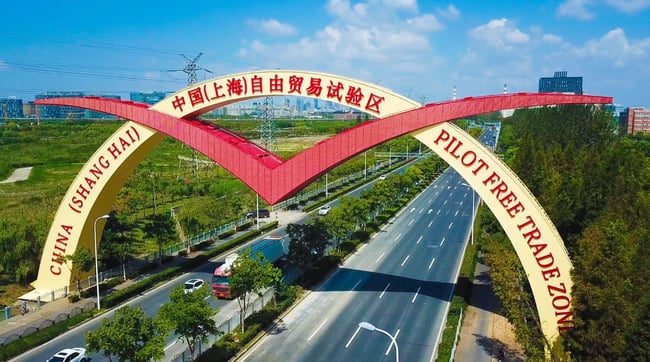
Lin-gang Special New Area of China
The Lin-gang Special Area of SHFTZ is one of the major free trade zones in China, covering an area of over 119.5 square kilometers. The State Council approved this area on July 27, 2019, followed by the formal establishment on the August 20 of the same year. The establishment of Lin-gang Special Area is an important strategy fort China’s further opening-up and its strong commitment to sider openness in the following decades, showing its warm welcome to the economic globalization.
In 2022, the total output value of enterprises above the designated size reached RMB 348.2 billion in 2022. Among them, the investment in the manufacturing industry reached RMB 36 billion. 104 cutting-edge industry projects were signed with a total investment of RMB 138.95 billion. The total international service trade volume exceeded USD 10 billion, up by 40% over the previous year.
By the end of year 2025, an institutional framework for the facilitation of investment and trade is expected to be established, and this area will become home to a cluster of world-leading enterprises, which will significantly strengthen the innovation capabilities. The development priorities of Lin-gang Special Area include AI, ICs, biopharmaceutical, civil aviation, new-energy and intelligent connected vehicles, high-end equipment manufacturing, new materials, and hydrogen energy.
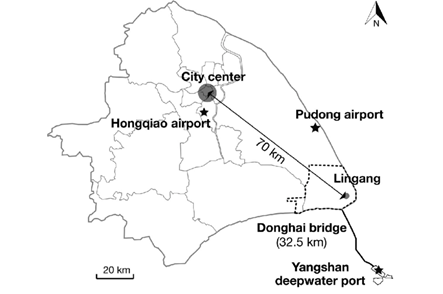
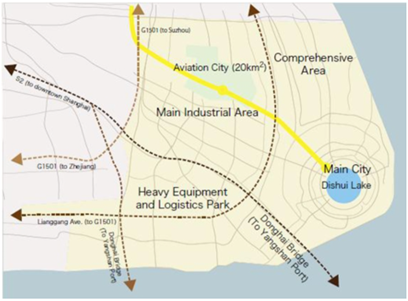
Hongqiao International Central Business District
On November 1, 2022, the ‘Regulations of Shanghai Municipality on Promoting the Development of Hongqiao International Central Business District’ officially came into effect. Focusing on opening-up, Hongqiao CBD is committed to developing itself into a high-level international central business district by making greater efforts in innovating institutions to ensure further opening-up and deepened reforms.
This district mainly focuses on high-capacity headquarters economy, high-end service economy, high-flux trade economy, and high-spillover exhibition economy. With the advantages of big commerce, over 500 enterprises have settled down in this area including Roche, Shell, Unilever, and Anta.
Other City Areas in Shanghai
By the end of 2022, there are 16 districts in Shanghai, including Huangpu, Pudong New District, Jing’an, and Xuhui, etc., with their individual promotion priorities of different industries.
You can get more information from the figure showing the specialized industry parks in different districts of Shanghai. All districts in Shanghai have their own incentive policies for various types of industries. The policy structure can be complex and may be not explained in details in a short blogpost. You are also welcome to talk with Hongda to get detailed suggestions on how to choose the ideal location for your business. We can also help you get the tax rebate at an average rate of 10% with absolutely no risk! Simply book a free meeting with Hongda’s consultant to discuss your business plan!
Reference: 2023 White Paper on Environment for Foreign Investment in Shanghai
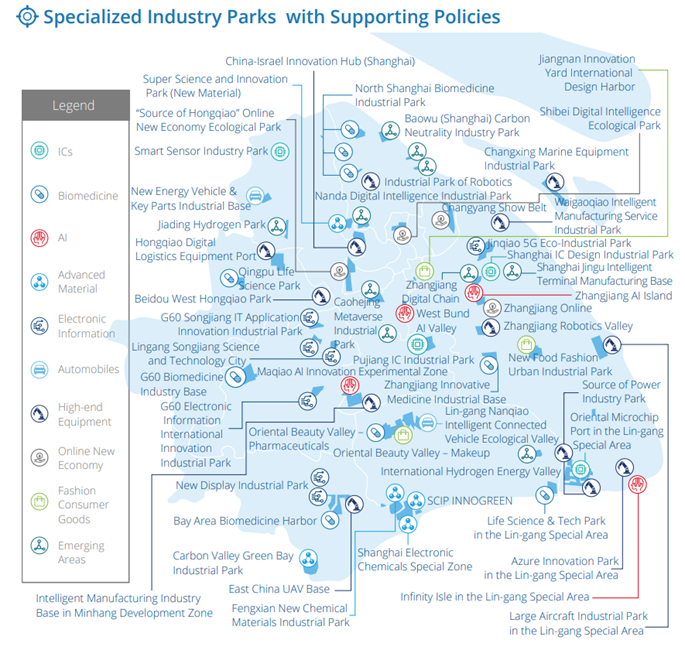
Incentive Policies in Shanghai
1. Supportive Policies for Headquarters
Shanghai will continue to drive high-quality development of the headquarters economy in support of MNCs with RHQs in this city to better serve the world. Based on the scales and the asset values of the overseas parent companies, there are three levels of entities that are qualified to meet the certification criteria: RHQs, Quasi-RHQs, and Business Unit Headquarters of MNCs. After meeting the requirements, they will be eligible to enjoy benefits including establishment subsidies (RMB 5 million), office rental and purchase subsidies, performance rewards, flexible currency exchange and management, simplifies exit and entry procedures, trading incentives, and talent recruitment.
2. Supportive Policies for Foreign-funded R&D Centers
A series of supportive policies have been issued to promote the development of foreign-funded open innovation platforms during the 14th Five-Year Plan, aiming to build the science highland in China and across the globe. Foreign-funded open innovation platforms, foreign-funded R&D centers, and global R&D centers can enjoy convenient research equipment customs clearance, financial services, talent attraction, staff training subsidies, IP protection, and industry-university-research cooperation supports.
3. Talent Support
Shanghai has launched various policies to support talents from both the local human resource pool and overseas market. For example, Shanghai Pujiang Talent Program 2022 focuses on encouraging the start-ups by qualified talents by providing subsidies ranging from 0.15 million to 0.3 million per person. As for foreign investors and talents, the ‘Notice on Continuously Improving the Matters Related to Online Approval for Foreigner’s Work Permit in China (Version 4.0) to Attract Foreign Talents’ makes it possible for foreign workers to experience flexible recognition criteria. Young foreign professionals, including fresh foreign doctoral graduates of key disciplines, can apply for Talent Visa (R visa) and receive preferential treatment.
Want Some Refreshment After Work?
‘Shanghai is in the same echelon as New York, London, Paris and Tokyo in terms of core indicators of cultural competence. It has the basic form of an international cultural metropolis with a reputation highly recognized in China and beyond, while retaining its own cultural characteristics.’, reported by the International Cultural Metropolis Evaluation.
Shanghai is one of China's largest and most modern cities, and its charm has always attracted foreigners from all over the world. For more than 150 years, many overseas people have settled here. What has always attracted countless expats to Shanghai is the great number of opportunities, as well as the colorful lifestyles and high-level education chances here.
The various public schools, private schools, kindergartens, international school provide countless choices for the education of your children, making them receive international educational resources across the city. There are also some world-famous universities and colleges lying in this region.
The over 450 hospitals across Shanghai form the solid medical healthcare framework by integrating medical service in the YRD region. The highly accessible family doctor (GP) services also enhance the local medical service mechanism.
Conclusion
Taking benefits of the huge advantages brought by ocean transportation and the Yangtze River, which has "the world's largest inland shipping capacity", Shanghai has been a key port for China's trade since ancient times. As the world's largest trade port with a vast economic hinterland, Shanghai is the city of choice from a geographical point of view. The Lin-gang Economic Zone, where high-tech industries are clustered around the port, has made Shanghai a comprehensive hub integrating shipping, finance, trade, insurance, legal and other services.
The unique geographical advantages make Shanghai an important hub connecting the internal and external circulations. China's unswerving insistence on opening to the outside world will further unleash the potential of this city. And it is exactly the time for you to start your own business here in Shanghai. If you are still looking for more information about how to start your business in this Magical City, please do not hesitate to book a free consultation with Hongda to know more!





